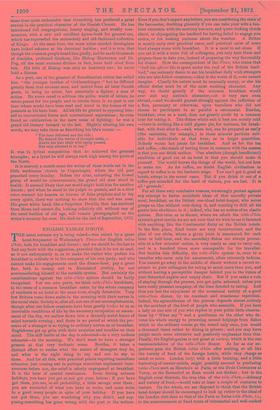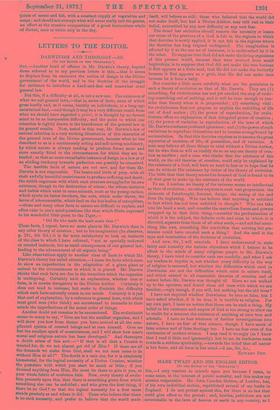ENGLISH TABLES D'HOTE.
THE usual autumn cry is being raised—was raised by a great hotel-frequenter in Wednesday's Times—for English tables d'hote, both for breakfast and dinner ; and we should be the last to find any fault with the suggestion, provided that it be not so used, as it not unfrequently is, as to make the visitor who prefers his breakfast in solitude or in the company of his own party, and who cannot make his engagements meet the dinner-hour, pay a great fine, both in money and in diminished civility, for not accommodating himself to the sociable system. But certainly the considerations against the table-d'hOte system should be fairly recognised. For our own parts, we think table-d'hote breakfasts, in the sense of a common breakfast eaten by the whole company of residents at an hotel at the same hour, simply detestable. Very few Britons come down stairs in the morning with their nerves in the social state. Society is, after all, not one of our accomplishments, though after our fellow-creatures have been gently broken to us as inevitable conditions of life by the necessary occupation or amuse- ment of the day, we mellow down into a decently social frame of mind towards evening ; and there is no period at which the pre- sence of a stranger is so trying to ordinary nerves as at breakfast. Englishmen get up grim with their anxieties and troubles on their mind. The stiff battle of the day is rehearsed—in a very undress rehearsal—in the morning. We don't want to have a stranger present at that very inchoate scene. Besides, it takes a distinct effort to realise what the nature of strangers May be, and what is the right thing to say and not to say to them. And for all this, with practical points requiring immediate attention just coming out in perhaps somewhat unpleasant lumi- nousness before one, the mind is utterly unprepared at breakfast. It is the hour of mental rumination. Even during autumn holidays, you have just got or not got your letters ; if you have got them, you are, in all probability, a little savage over them ; you are reminded of what you have to write, and must write to a good many people in spite of your holiday. If you have not got them, you are wondering why you didn't, and sup- posing something has gone wrong with the post or the writers.
Even if you don't expect anyletters, you are considering the state of the barometer, doubting gloomily if you can take your wife a ten- hour excursion with the mercury concave, and queer-looking clouds about, or objurgating the landlord for having failed to engage you mules, or for looking ominous about the weather. A Briton is mostly surly over practical cares, and practical cares of some kind always come with breakfast. It is a meal to eat alone. If you eat it with a room full of colleagues, you only hate them and prepare them to hate you, instead of preparing the way favourably for dinner. How the correspondent of the Times, who states that "half his official life is spent under the roof of the British land- lord," can seriously desire to eat his breakfast daily with strangers who are also fellow-creatures,—that is the worst of it,—we cannot imagine. Clearly his nature must be unusually sunny, or else his official duties must be of the most soothing character. Any way, we doubt greatly if the common breakfast would ever suit any nation's character,—it is very rare even abroad,—and we should protest strongly against the infliction of a fine, pecuniary or otherwise, upon travellers who did not choose to participate in so painful a ceremonial. Besides, breakfast, even as a meal, does not greatly profit by a common hour for taking it. The dishes which suit it best are mostly cold —there is nothing like a cold pigeon pie, for instance, for break- fast, with fruit after it,—and, when hot, can be prepared as easily (like omelettes, for example,) in those minuter portions suit- able for individuals at that hour, as in larger quantities. Nobody wants hot joints for breakfast. And as for the tea and coffee,—the result of having those in common with the masses is that you can drink neither. One absolute (though insufficient) condition of good tea at an hotel is that you should make it yourself. The world knows the things of the world, but not how to make tea. As for coffee, no doubt English civilisation in regard to coffee is in the barbaric stage. You can't get it good at hotels, except in the rarest cases. But if you drink it out of a coffee-pot intended for the herd of visitors, you are lost. It is all grounds.'
For all these very conclusive reasons, we strongly protest against any attempt to fasten socialistic ideas of that sacredly private meal, breakfast, on the British one-idead hotel-keeper, who never grasps an idea without over-doing it, and wanting to drill all his guests into obedience to it ; indeed, who has no notion of an elastic system. But even as to dinner, where we admit the table-d'hôte system's great merits, we are not sure that we wish to see it fastened with anything like the Continental fixity on the British hotels. In the first place, fixed hours are very inconvenient, and the plan of our clubs, where a given joint is announced for each hour or half-hour, and the secondary dishes are always procur- able at a few minutes' notice, is very nearly as easy to carry out, and is a hundred times more manageable for the traveller. But besides this difficulty, the table-d'Ute system is, even to a traveller who cares only for amusement, often extremely tedious. You cannot go away in the middle of dinner without a covert re- proach to your colleagues for eating so much more than you, and without leaving a perceptible damper behind you in the vision of your discarded napkin and empty chair. But if you make a rule of staying through the process, you get quite ashamed, unless you have really pleasant company, of the time devoted to eating. And thus you lose the enjoyment of the occasional variety of a good table-d'hote dinner, by its constant and wearisome repetition. Indeed, the agreeableness of the process depends almost entirely on the accident of the kind of people who assemble. If you have a lady on one side of you who replies to your polite little observa- tions by " What say "? and a gentleman on the other who de- votes his whole energy to procuring second helpings from dishes which in the ordinary course go the round only once, you would a thousand times rather be dining in private; and you may have people much more obtrusive and positively unpleasant than this. Finally, the English genius is not great at variety, which is the one recommendation of the table-d'hote dinner. As far as our ex- perience goes, the British tables d'hôte offer nothing at all like the variety of food of the foreign hotels, while they charge as much or more. London itself, with a little training, and a little borrowing of master-minds, might possibly succeed in producing tables d'hote such as Meurice's at Paris, or the Trois Couronnes at Vevey, or the Bernerhof at Bern would not disdain ; but in the English rural districts, the true idea of the table d'hote,—delicacy and variety of food,—would take at least a couple of centuries to mature. On the whole, we are disposed to think that the British hotel-keeper should be encouraged to look up rather to the ideal of the London club than to that of the Paris or Swiss table d'hote, i.e., to the announcement at fixed hours of substantial and well-cooked joints of meats and fish, with a constant supply of vegetables and soups ; and should not attempt what will never really suit his genius, an effort at the creative composition of a great harmonious whole tof dinner, once or twice only in the day.



































 Previous page
Previous page